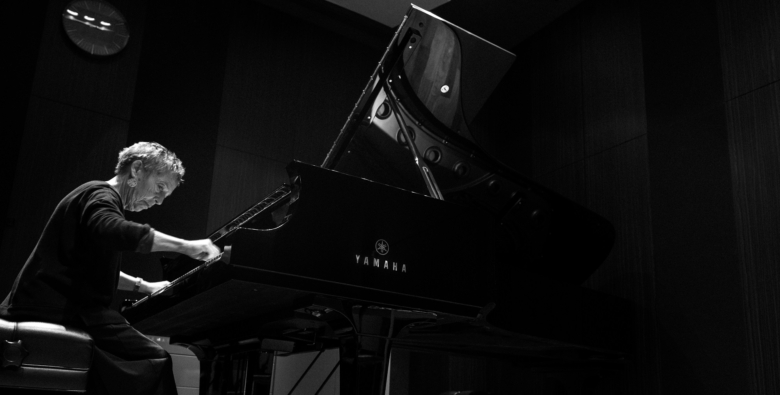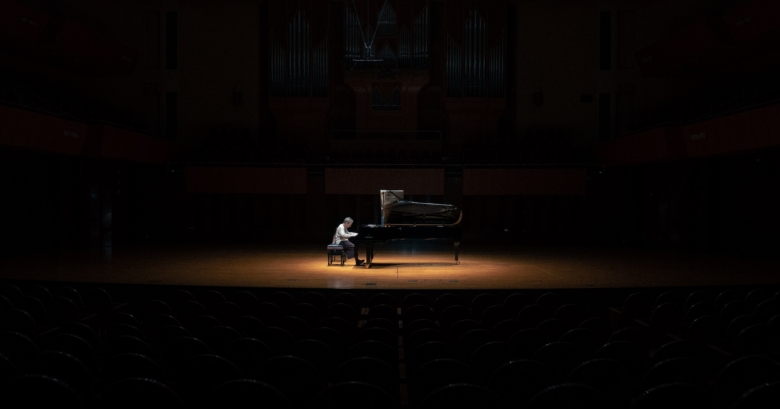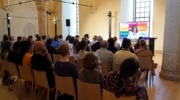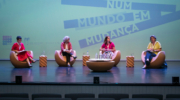Portuguese renowned pianist Maria João Pires wins Helena Vaz da Silva European Award 2025
Press release English – Portuguese
The Portuguese pianist Maria João Pires is the winner of the Helena Vaz da Silva European Award for Raising Public Awareness on Cultural Heritage 2025. This European recognition pays tribute to Maria João Pires’ exceptional aptitude for communicating European culture and values through music. The award ceremony will take place on 1 November at the Calouste Gulbenkian Foundation in Lisbon.

Maria João Pires © Belgais – Centro para o Estudo das Artes
The Helena Vaz da Silva European Award was established in 2013 by the Centro Nacional de Cultura (Portugal) in collaboration with Europa Nostra and the Portuguese Press Club, and has the support of the Ministry of Culture, Youth and Sports and the Ministry of Foreign Affairs of Portugal, the Calouste Gulbenkian Foundation and Tourism of Portugal.
Reacting to the announcement, Maria João Pires stated: “Having an award means having an honour. To have an honour, and to be aware of it, is to remember in detail all the people who gave their time, collaborated and helped this honour to be awarded. That’s why my first reaction will always be to say ‘thank you very much’ to everyone for this opportunity.”

Maria João Pires © Belgais – Centro para o Estudo das Artes
The Award Jury highlighted: “Maria João Pires is one of Europe’s most poetic and influential pianists. Her work transcends performance: she is a visionary educator, a cultural thinker, and a quiet revolutionary in the field of musical heritage. Her career, deeply rooted in the values of empathy, inclusion, and artistic excellence, embodies the mission of the Helena Vaz da Silva Award: to raise public awareness on Europe’s cultural heritage through impactful, humanistic engagement.”
About Maria João Pires
Born in 1944, Maria João Pires studied piano in the conservatory of her birth town, Lisbon. Pires remembers attending a concert at age 4 given by the French violinist Ginette Neveu as being a “profound experience”. The young Pires gave her first public performance the same year and began her piano and music studies with Campos Coelho and Francine Benoît, continuing later in Germany, with Rosl Schmid and Karl Engel. In addition to performing professionally, she has made recordings for Erato for 15 years and Deutsche Grammophon for 20 years.

Maria João Pires © Fábio Cunha
Since the 1970s, Pires has devoted herself to reflecting the influence of art in life, community and education. She has searched for new ways to establish this way of thinking while respecting the development of individuals and cultures, and encouraging the sharing of ideas.
In 1999, on an isolated farm of a village located in the centre interior of Portugal, she created the Belgais Centre for the Study of the Arts, where young artists meet and work. There, Pires still regularly offers interdisciplinary workshops for professional musicians and music lovers. Concerts and recordings regularly take place in the Belgais concert hall, and in the future, there are plans to share them with the international digital community.
In 2012, Pires launched the Partitura Project in Belgium, with the aim of encouraging cooperation and social engagement among pianists and balancing the dynamic between artists towards altruism rather than competitiveness. The project is helping to spread this philosophy worldwide.
The consolidation of European composers’ works and their dissemination, as well as the way Pires has reflected about the intersections of life, society and the world of music have made a remarkable contribution to the defence of European culture and heritage.
More information
Award Jury
The Jury of the Helena Vaz da Silva European Award, chaired by Maria Calado, President of the Centro Nacional de Cultura, is made up of independent specialists in the fields of culture, heritage and communication from several European countries: Francisco Pinto Balsemão (Portugal), President of the Board of Directors of the Impresa Group; Piet Jaspaert (Belgium), Vice-President of Europa Nostra; João David Nunes (Portugal), Vice-President of the Portuguese Press Club; Guilherme d’Oliveira Martins (Portugal), Administrator of the Calouste Gulbenkian Foundation; Irina Subotić (Serbia), Member of Europa Nostra Serbia; and Marianne Ytterdal (Norway), Member of the Council of Europa Nostra.
Helena Vaz da Silva European Award
The Helena Vaz da Silva European Award is named after the Portuguese journalist, writer, cultural and political activist Helena Vaz da Silva (1939-2002), in memory and recognition of her notable contribution to the dissemination of cultural heritage and European ideals. It is awarded annually to a European citizen whose career has been distinguished by activities of dissemination, defence and promotion of Europe’s cultural heritage, in particular through literary or musical works, reports, articles, chronicles, photographs, cartoons, documentaries, films and radio and/or television programmes.
The previous laureates of this Award were the German photographer Thomas Struth (2024); the Baritone Jorge Chaminé, President of the Centre Européen de Musique (2023); the Ukrainian conductor Oksana Lyniv (2022); the Belgian contemporary dance choreographer Anne Teresa De Keersmaeker (2021); the Portuguese poet and librarian of the Vatican Library José Tolentino Mendonça (2020); the Italian physicist Fabiola Gianotti (2019); the British historian and broadcaster Bettany Hughes (2018); the German filmmaker Wim Wenders (2017); the French editorial cartoonist Jean Plantureux, known as Plantu, and the Portuguese philosopher, Eduardo Lourenço (ex aequo, 2016); the musician and Spanish conductor Jordi Savall (2015); the Turkish writer and Nobel Prize winner Orhan Pamuk (2014); and the Italian writer Claudio Magris (2013). Their speeches at the ceremonies for this Award can be heard here.





